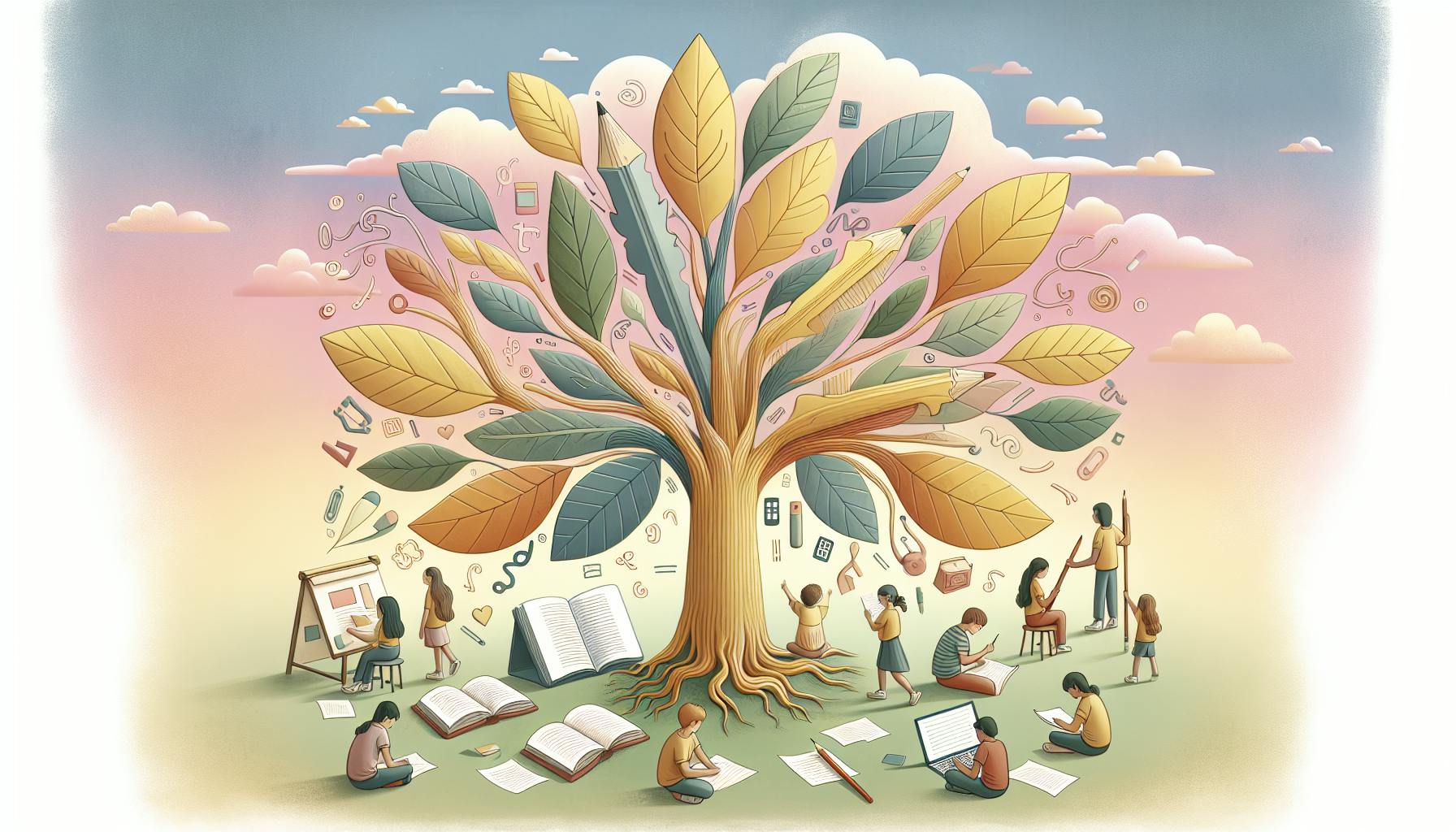Most teachers would agree that exploring complex themes in literature with students can be challenging.
But teaching William Golding's classic novel Lord of the Flies provides rich opportunities for discussion around provocative topics like human nature, morality, and social order.
This comprehensive teacher's guide for Lord of the Flies will empower you to immerse students in critical analysis and debate around the novel's potent themes and disturbing yet engaging plotline.
Introduction to 'Lord of the Flies': A Teacher's Perspective
'Lord of the Flies' by William Golding is a classic novel that explores profound themes regarding human nature and society. Set during an unspecified war, a group of schoolboys are stranded on a deserted island after their plane is shot down. With no adults present, the boys attempt to establish order and govern themselves. However, tensions rise as two rival groups emerge, led by the charismatic Ralph and the brutal Jack. As their makeshift society deteriorates, the boys descend into savagery and chaos.
Many English and literature teachers assign this novel because it allows robust discussions about complex themes that remain distressingly relevant today. The book provides a microcosm to analyze the human condition - our laws, rules, social order contrasted with our capacity for evil when unchecked.
Significance in Classic Literature and Teen Books
Published in 1954, 'Lord of the Flies' is considered a pioneering work that helped launch the genre of dystopian fiction. The novel's bleak view of human nature was groundbreaking for its time. Generations of students have analyzed this book as a reflection of our society's failings - our susceptibility towards prejudice, violence, and moral decay.
Though dark in tone, the book resonates strongly with young readers. The cast of characters are all children, easier for teens to identify with. The rich symbolism also makes the work ideal for classroom analysis and debate.
Exploring the Novel's Core Themes
'Lord of the Flies' touches on universal themes that teachers can emphasize through lessons and activities:
- Loss of Innocence - The boys' initial hopefulness and unity unravels as they give in to fear, superstition, and tribalism. Their journey traces the loss of childhood innocence.
- Rules vs Anarchy - Ralph represents law and order while Jack's tribe descends into chaos. The tension between the two philosophies is central.
- Good vs Evil - Symbols like the conch shell and Lord of the Flies totem trace the conflict between moral urges. The "beast" may represent the evil within each boy.
Synopsis and Chapter-by-Chapter Breakdown
Here is a concise summary of key plot points that teachers can reference:
Chapter 1 - Schoolboys Ralph, Piggy and Jack arrive on a deserted tropical island after surviving a plane crash...
Chapter 2 - Ralph is elected leader for his charisma and the conch shell is used to represent order...
Chapter 3 - Jack struggles to hunt food and begins indulging his cruel tendencies, foreshadowing future conflict...
Chapter 4 - Tensions heighten between Jack's burgeoning savagery and Ralph's civilizing influence...
Chapter 5 - Simon's encounter with the "beast" hints at the true nature of evil - coming from within the boys themselves...
Chapter 6 - Roger's aggression intensifies while Ralph strives to preserve moral order amid signs of unraveling...
Chapter 7 - Jack forms his own anarchic tribe, luring many boys away from Ralph's leadership with promises of meat, fun and freedom...
Chapter 8 - Simon's revelation about the "beast" and subsequent murder by the tribal frenzy of Jack's hunters proves a turning point of the collapse into primal chaos...
Chapter 9 & 10 - Ralph's group dwindles further, while Jack's "fun" tribe progressively devolves into violent, maniacal anarchy...
Chapter 11 - Piggy's savage murder and Ralph's desperate escape brings the final fall as the boys fully embrace nihilistic tribalism, sadism and death in their new society.
Chapter 12 - Ralph narrowly escapes the fiery chaos, only to encounter a naval officer who symbolizes the restoration of civilization and adult order amid the wreckage.
Why is Lord of the Flies a good book to teach?
Lord of the Flies by William Golding is considered a great novel for teaching for several reasons:
It sparks thought-provoking discussions
The novel brings up complex themes like human nature, morality, leadership, and social order versus chaos. Having students analyze and discuss these themes encourages critical thinking and debate skills.
It develops literary analysis abilities
Lord of the Flies has rich symbolism and allegory that allow students to practice interpreting metaphors, motifs, characterization, and more. Analyzing the novel builds essential analysis skills.
It stresses using text evidence
When making claims about the novel's meaning, students must back up observations with quotes and examples from the text. This develops vital evidence-based reasoning abilities.
Overall, Lord of the Flies enables students to sharpen many ELA skills while engaging with an impactful, thought-provoking story that sparks discussion on humanity - making it a versatile novel to teach.
Why is Lord of the Flies banned in schools?
Lord of the Flies by William Golding has faced bans and challenges in some schools due to concerns over its violent content and portrayals of bullying. Some of the main reasons cited for banning the book include:
Profanity and Lurid Passages
The book contains profanity and some passages that describe violent or disturbing events. For example, there are scenes involving the brutal killing of pigs and fights between the boys. Some find these passages too graphic for young readers.
Statements Defamatory to Minorities, Women, and Disabled
There is very little female representation in the novel. Some readers feel the book promotes stereotypes about minorities and those with disabilities. These concerns have led some schools to stop teaching Lord of the Flies.
Religious Viewpoint
The lack of adult supervision causes the boys to descend into chaos and violence, which some see as defamatory towards concepts of morality and human nature. There are no authority figures representing religion or spirituality.
Ultimately, Lord of the Flies raises important questions about human nature and morality. However, its complex themes and violent content have made it one of the most banned books in schools and libraries. Teaching the novel requires care to address sensitive topics properly. With guidance, it can open thoughtful discussions about ethics, society, and growing up.
What grade is appropriate for Lord of the Flies?
Lord of the Flies by William Golding is generally considered appropriate for students in grades 9-12. Here is some additional context on the reading level and content:
Reading Level
The Lexile measure of Lord of the Flies is 770L, which indicates it is best suited for high school-level readers. The vocabulary and sentence structure align to typical texts for grades 9-10.
Content Considerations
While Lord of the Flies is shelved in the young adult section, parents and teachers should use caution with the violent content and complex themes. There are scenes involving hunting, killing animals, and aggression between the boys that may require guidance.
The novel explores weighty subjects like good vs. evil, loss of innocence, and the savagery of human nature. There are also allusions to war and nuclear attacks. Teachers should be prepared to discuss these mature topics with students.
Appropriate Grade Level
Most educators introduce Lord of the Flies in 9th or 10th grade. By this age, students have the literacy skills and cognitive abilities to comprehend the sophisticated language and analyze the allegories. They are also mature enough to thoughtfully discuss the heavy themes presented.
In summary, while technically marketed as a young adult novel, Lord of the Flies demands a level of reading proficiency and emotional maturity best suited for high school students. With support from the teacher, it can be an incredibly meaningful text for grades 9-12.
What are the teaching themes in Lord of the Flies?
Lord of the Flies by William Golding explores several powerful themes that resonate with educators and students. Here are some of the key themes that can spark insightful discussions and activities in the classroom:
The conflict between civilization and savagery
- Students can analyze how the stranded boys descend from civilized behavior into tribal chaos and violence
- Compare the leadership styles of Ralph and Jack to highlight the tension between democracy and authoritarianism
Loss of innocence
- Trace how the boys' behavior changes as their rules and norms unravel over time
- Discuss how their increasingly violent acts reflect a loss of innocence
Underlying evil in human nature
- Explore the symbolic significance of characters like Piggy, Simon, and Roger
- Debate whether Golding suggests that evil exists naturally within all human beings
Corrupting effect of power
- Examine how Jack's hunger for power leads him to become cruel and domineering
- Analyze how the boys' obedience to authority figures leads to poor decisions
These compelling themes in Lord of the Flies provide rich fodder for analysis and discussion with students. Teachers can design engaging activities like debates, creative projects, analytical essays, and more using the themes as a foundation.
sbb-itb-bb2be89
Setting the Stage: Pre-Reading Activities for 'Lord of the Flies'
Teachers can use the following pre-reading activities and resources to introduce key concepts from Lord of the Flies and pique students' interest before reading begins.
Building Vocabulary Before Reading
Pre-teach challenging vocabulary words that are essential to comprehending the novel's themes and plot. Useful lists of terms can be found at Vocabulary.com and Membean. Quizzes and games like Quizlet further cement comprehension.
Engaging Students with Creative Writing Prompts
Prompt students to relate the novel's exploration of rules, leadership and bullying to their own lives by journaling or discussion. Useful prompts include:
- What rules would you make if stranded on an island with classmates?
- What does leadership mean to you? When have you been a leader?
- What constitutes bullying? How have you dealt with bullies?
Anticipatory Discussions and Debates
Hold structured debates and discussions around themes like:
- Is human nature fundamentally good or evil?
- How much does society and civilization restrain our true nature?
- What roles do rules and leadership play in a community?
Graphic Organizers for Pre-Reading
Have students make predictions about plot and themes using graphic organizers:
- Anticipation guides to analyze pre-conceptions
- Plot diagrams to visualize narrative structure
Guided Reading Strategies: Enhancing Comprehension and Engagement
Resources to check comprehension, promote close reading and critical thinking throughout the reading process.
Close Reading with Chapter Study Guides
Chapter-by-chapter guides can enhance students' comprehension and critical analysis of the text. For each chapter, provide questions that:
- Check plot comprehension and character development
- Encourage close reading of important passages
- Identify literary devices and analyze their effect
- Make text-to-self, text-to-text, and text-to-world connections
Supplement with graphic organizers for students to structure their notes and visualize relationships between characters, events, themes, etc.
Encouraging Analysis with Writing Prompts
Craft thought-provoking essay and discussion prompts that target specific events, symbols, characters, or themes in the novel. Prompts should require students to:
- Provide text evidence to support their analysis
- Make inferences about characters and their motivations
- Identify and explain the development of themes
- Assess the impact of key scenes and turning points
Such analytical writing promotes critical thinking and deepens understanding of the novel.
Interactive Reading Activities
Get students actively involved in the reading process through:
- Role-plays of key scenes
- Hot-seat questioning of characters
- Debates on the motives and ethics of characters
- Dramatizations presented to the class
These collaborative activities encourage perspective-taking, analysis of characters' choices, and moral reasoning.
Utilizing Worksheets for Novel Study
Provide focused printables and handouts examining different facets of the novel, including:
- Character analysis worksheets
- Theme graphic organizers
- Plot diagram handouts
- Vocabulary building exercises
- Timeline of key events
Worksheets reinforce comprehension, cement learning of new concepts, and give students material to reference later when writing essays.
Post-Reading Reflections: 'Lord of the Flies' Assessment and Analysis
Comprehensive Essay Prompts
Lord of the Flies explores complex themes around human nature, morality, rules vs anarchy, and leadership. Here are some essay prompts that assess students' understanding of these key ideas:
- How do Ralph, Jack, Piggy, and Simon embody different aspects of human nature? What does this suggest about Golding's perspective on human nature?
- Is Lord of the Flies an allegory for the inherent evil of human nature? Why or why not? Support your analysis with evidence from the text.
- How does Golding develop the central tension between rules, order, and anarchy over the course of the novel? What is his commentary on the human need for order and governance?
- What types of leadership emerge in Lord of the Flies? How effective or dangerous are they? What attributes make an effective leader, according to Golding?
Creative Projects and Alternative Assessments
Here are some creative ways for students to engage further with the themes in Lord of the Flies:
- Design an alternate ending where the boys are rescued before descending into chaos. How might this change the message or meaning of the novel?
- Adapt the plot to a modern setting such as a deserted island after a plane crash. How might the themes translate to today's world?
- Create a movie poster with taglines that capture the essence of the novel's themes around human nature and morality.
Informational Text Analysis
Students can analyze Lord of the Flies alongside informational texts about related topics:
- Compare and contrast the novel to philosophical essays on human nature by thinkers like Thomas Hobbes or Jean-Jacques Rousseau.
- Read and discuss real-life stories of people stranded on deserted islands or in the wilderness. How do their experiences compare to the characters in the novel?
- Research the historical context of the novel, including World War II and the Cold War. How might this backdrop have influenced Golding's perspective?
Test Preparation and Review Strategies
To help prepare students for tests on Lord of the Flies:
- Hold small group review sessions focused on the main characters, themes, symbols, and plot developments. Engage in discussion to clarify understanding.
- Practice sample short answer and essay questions. Provide model responses and give actionable feedback students can apply to improve their answers.
- Create Jeopardy-style review games focused on characters, quotes, literary devices, and significant scenes from the novel. Make it fun and engaging!
Extending the Learning: Additional Resources for Teaching 'Lord of the Flies'
Literary Analysis Activities and Handouts
Supplementary materials like literary analysis worksheets can be valuable for developing critical thinking skills. Teachers can use reproducible handouts focused on plot, characters, themes, and symbolism to guide students in close reading and textual analysis. Useful activity ideas include:
- Character maps to visualize relationships and development
- Storyboards to sequence key plot events
- Theme graphic organizers to analyze central ideas
- Symbol trackers to note recurring images and metaphors
These resources help students practice skills like drawing inferences, citing text evidence, determining author's purpose, and understanding literary devices.
Interactive Review Games and Activities
Review games motivate students to revisit concepts from the novel in engaging ways. Teachers might incorporate:
- Jeopardy or bingo games using events, vocabulary, characters, etc.
- Role playing activities to act out scenarios
- Debates focused on thematic questions
Making learning interactive, even through simple paper-based games, can increase participation and content retention.
Printable Study Guides and Resources
Concise study guides, summaries, and handouts allow students to review efficiently. Useful materials include:
- Chapter synopses
- Character, setting, plot overviews
- Vocabulary lists and definitions
- Quotation references
- Discussion questions
These supplementary resources help reinforce literary concepts and free up class time for higher-order tasks.
Multimedia and Technology Integration
Multimedia tools effectively engage tech-savvy learners. Consider incorporating:
- Film and TV adaptations for comparison
- Audiobooks to aid struggling readers
- Online book discussions with other classrooms
Blending traditional curriculum with digital elements can help diversify instruction for different learning styles.
Conclusion: Reflecting on 'Lord of the Flies' in the Classroom
'Lord of the Flies' by William Golding is a complex and thought-provoking novel that explores profound themes related to human nature and morality. As such, it can stimulate rich discussion and analysis in the middle or high school English classroom. Here are some key reasons why 'Lord of the Flies' has enduring value as a teaching text:
Examines weighty themes
The novel delves deep into issues like civilization versus savagery, loss of innocence, and the inherent evil or good within all people. By wrestling with these big ideas, students can grapple with meaningful questions about human nature and morality.
Features dynamic characters
The novel's main characters like Ralph, Jack, Piggy, and Simon are complex and embody different philosophies and aspects of human nature. Analyzing the changes these characters undergo invites reflection on the complexity of human psychology.
Has literary merit
As an allegorical novel and morality tale that draws on significant symbols, 'Lord of the Flies' has substantial literary merit. Studying its plot, themes and literary devices allows students to develop critical thinking and analysis skills.
Sparks comparisons
The novel lends itself to rich comparisons with other dystopian or survival-themed works of literature. Engaging students in comparing and contrasting texts enhances literacy skills and critical faculties.
In short, 'Lord of the Flies' gives teachers a multi-faceted text to stimulate vibrant discussion, literary analysis and skill development with middle and high school students. Its enduring status as a classic and seminal novel in the English canon cements its value in the ELA classroom.


